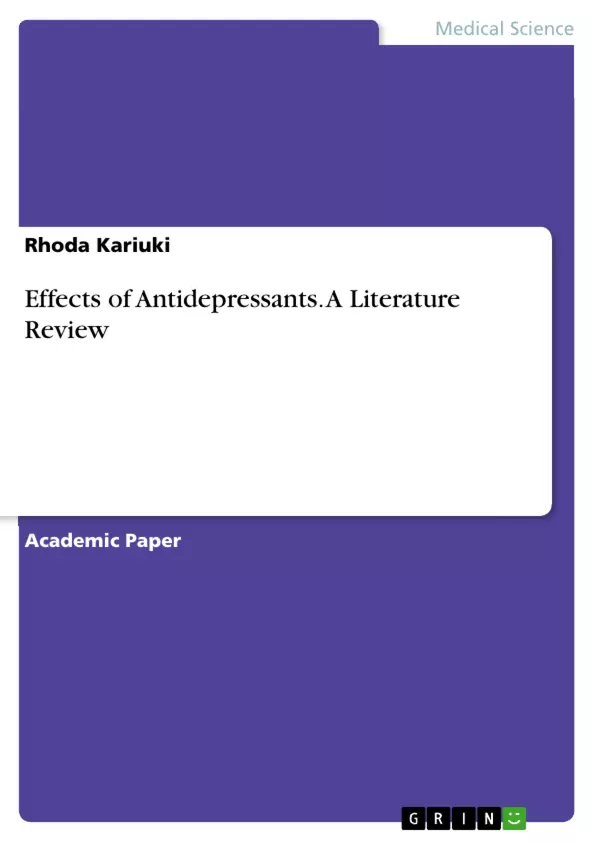This scientific paper discusses the effects of antidepressants, by use of a literature review.
Depression is among the most prevalent illnesses worldwide. Unfortunately, the response to pharmacological intervention is frequently ineffectual. Ketamine has been used in the application of brand-new glutamatergic drugs for the treatment of Treatment-Resistant Depression (TRD), as well as their alleged effectiveness mechanisms. About 30% of patients with depression do not respond well to psychotherapy or antidepressants. Although Electroconvulsive Therapy (ECT) is more effective at treating depression, its use is limited by adverse mental effects, and the likelihood of recurrent depression is higher. The prolonged use of antidepressants has been associated with side effects that have detrimental health consequences.
Furthermore, some antidepressants such as Ketamine and Esketamine have adverse effects on the human body. The purpose of this research was to establish whether Ketamine and Esketamine have significant health problems. Additionally, the research sought to answer the research question of whether the level of side effects has significance to determine the eradication of antidepressants to patients. The research concluded that the level of side effects of Ketamine and Esketamine is not significant to establish a serious health problem for depressant patients. Therefore, there is a pressing need to develop fresh treatment approaches for depression in general and focused interventions for depression.
Inhaltsverzeichnis (Table of Contents)
- Effects of Antidepressants
- Abstract
- Problem Statement
- Literature Review and Discussion
- Most of Ketamine's antidepressant properties are thought to be caused by N-Methyl-D-aspartate (NMDA) receptor resistance and the drug's impact on glutamate neurotransmission.
- Evidence from research suggests that Esketamine may have a better therapeutic impact than Ketamine.
- Like most medications administered to patients, Esketamine has various mild effects after administration.
- In some cases, patients can have more than one AEs (Flückiger et al., 2019).
- Another adverse effect of continuous use of Esketamine is a mental disturbance which in many cases may lead to suicidal ideation.
- Gaps in Research and Future Research Recommendations
- Conclusion
Zielsetzung und Themenschwerpunkte (Objectives and Key Themes)
This research aims to assess the significant health problems associated with Ketamine and Esketamine, particularly their potential side effects and implications for depression treatment. It seeks to determine if the level of side effects warrants the discontinuation of these antidepressants for patients.
- The efficacy and side effects of Ketamine and Esketamine as antidepressants
- The impact of these drugs on mental health and the potential for suicidal ideation
- The need for further research on the long-term effects of these medications, particularly their impact on relapse prevention and treatment for specific patient populations
- The potential for alternative treatment approaches for depression
- The ethical considerations and safety guidelines surrounding the use of these antidepressants
Zusammenfassung der Kapitel (Chapter Summaries)
- Abstract: The abstract provides an overview of the research, highlighting the prevalence of depression, the limitations of current treatments, and the need for alternative approaches. It introduces Ketamine and Esketamine as potential treatments for treatment-resistant depression (TRD) and outlines the research objectives.
- Problem Statement: This section discusses the effectiveness of Ketamine and Esketamine in treating depressive disorders while acknowledging their potential negative side effects. It emphasizes the importance of analyzing the efficacy and side effects of these drugs to provide effective treatment for mental disorders.
- Literature Review and Discussion: This section explores the mechanisms of action for Ketamine and Esketamine, highlighting their potential benefits and drawbacks. It summarizes research findings on the effectiveness, side effects, and administration methods of these medications. The discussion draws attention to the limited long-term research and the potential for relapse.
- Gaps in Research and Future Research Recommendations: This section identifies key gaps in the existing research, such as the need for long-term studies on relapse prevention, the lack of research on specific patient populations, and the need for more objective and ethically sound research methods.
Schlüsselwörter (Keywords)
This research focuses on the use of Ketamine and Esketamine in treating depression, specifically addressing their potential side effects and efficacy. Key themes include antidepressant effects, mental health, suicidal ideation, treatment-resistant depression, relapse prevention, long-term effects, alternative treatment approaches, ethical considerations, and safety guidelines.
Frequently Asked Questions
What are Ketamine and Esketamine used for in psychiatry?
They are used as fast-acting glutamatergic drugs for treating Treatment-Resistant Depression (TRD) in patients who do not respond to traditional antidepressants.
How do Ketamine and Esketamine work in the brain?
Their antidepressant properties are primarily linked to N-Methyl-D-aspartate (NMDA) receptor antagonism and their impact on glutamate neurotransmission.
What are the common side effects of Esketamine?
Side effects are generally mild but can include dissociation, mental disturbances, and in some cases, a potential increase in suicidal ideation.
Is the level of side effects significant enough to stop using these drugs?
The research concludes that the side effects of Ketamine and Esketamine are not significant enough to establish a serious health problem that outweighs their benefits for depressed patients.
What is Treatment-Resistant Depression (TRD)?
TRD is a condition where patients with major depressive disorder do not respond sufficiently to at least two different antidepressant treatments.
What are the gaps in current antidepressant research?
There is a lack of long-term studies on relapse prevention and research focusing on specific, diverse patient populations.
- Citation du texte
- Rhoda Kariuki (Auteur), 2023, Effects of Antidepressants. A Literature Review, Munich, GRIN Verlag, https://www.grin.com/document/1361337



